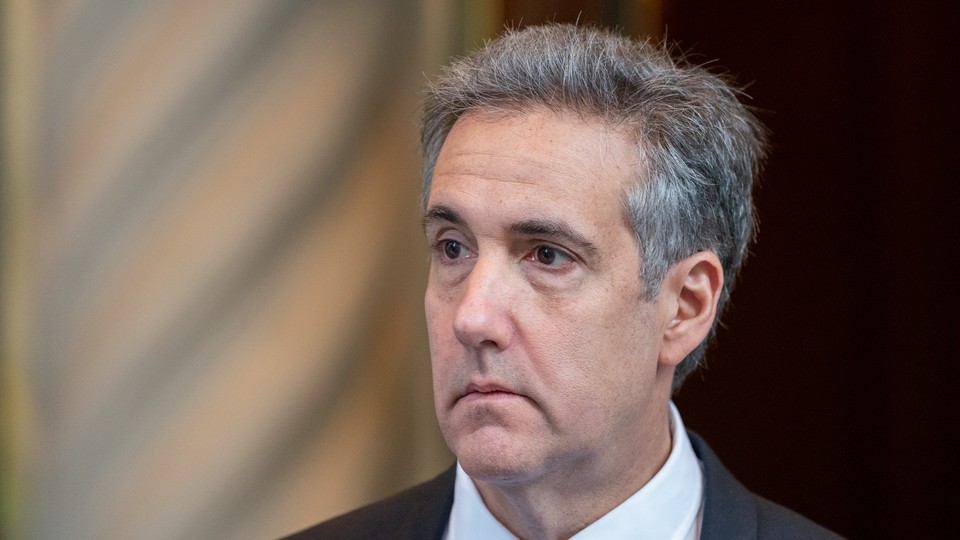Michael Cohen’s Credibility Paradox
6 min read
This is an edition of The Atlantic Daily, a newsletter that guides you through the biggest stories of the day, helps you discover new ideas, and recommends the best in culture. Sign up for it here.
Michael Cohen is an admitted liar and a convicted felon who is openly fueled by a thirst for revenge against Donald Trump. That he is so frank about his motives and past may actually make his testimony seem more credible to jurors.
First, here are three new stories from The Atlantic:
- The real meaning of Trump’s “unified Reich” post
- Reaganomics is on its last legs.
- The panic over smartphones doesn’t help teens.
Revenge of the Fixer
For the past week in New York, Michael Cohen has been a valuable—and fraught—star witness in Donald Trump’s criminal trial. The defense has tried to portray Cohen, Trump’s ex-lawyer and fixer, as a jilted lackey—which he openly is. To get a sense of his animus toward his ex-boss, look no further than his T-shirt depicting Trump behind bars, his admission in court that he once called Trump a “Cheeto-dusted cartoon villain,” and his two memoirs—Disloyal and Revenge—that trash the former president for his many transgressions.
Still, Cohen’s openness about his past and his motivations—in part forced by the public and criminal nature of his previous offenses—may actually make him seem more credible to a jury. His argument in court boiled down to: I committed crimes at Trump’s behest—and suffered consequences—because I would have done anything for him. That transparency made him appear like “the agent who was held accountable, whereas the principal has escaped accountability,” James Sample, a law professor at Hofstra University, told me in an email.
In 2018, Cohen was sentenced to three years in prison for crimes that included lying to Congress about plans to build a Trump Tower in Moscow and violating campaign-finance laws by making hush-money payments—one of which went to the adult-film star Stormy Daniels. He testified that, during the 2016 election, when she was considering publicizing the story of her alleged 2006 sexual encounter with Trump, Trump ordered Cohen to “take care of it.” In turn, Cohen paid Daniels $130,000 of his own money, which he claimed was later reimbursed by Trump.
On the stand, Cohen largely remained calm, though he had some shaky moments. He admitted during cross-examination that he had stolen tens of thousands of dollars from the Trump Organization, pocketing some of the money earmarked for a tech company. (When a prosecutor later probed him, he said that he had been angry because his bonus was cut.) The defense repeatedly tried to assail Cohen’s credibility—an obvious way to undermine a man who had previously lied under oath. Cohen testified that he had spoken with Trump in October 2016, via Trump’s bodyguard’s phone, about paying off Daniels. Attempting to ding Cohen on the details of the call, the defense insisted that Cohen hadn’t spoken with Trump and had actually discussed a different matter with the bodyguard, but Cohen stood by his testimony. Trump’s lawyers also called into question Cohen’s money-related stake in the trial. Cohen admitted that he has a financial interest in the outcome of the trial, because he writes and podcasts about Trump, but added that an acquittal would be better for him economically because it would give him “more to talk about.”
A common paradox lies at the heart of Trump’s criminal case, Sample told me: “To get at the truth in prosecuting criminal enterprises often requires relying on liars.” In most cases, being a convicted felon would make a witness far less credible. But the fact that Cohen has already served time in prison for admitting to crimes related to hush-money payments actually adds to his credibility as a witness here, Valerie Hans, a professor at Cornell Law School and an expert on juries, told me in an email; jurors won’t have to wonder if Cohen is testifying as part of a plea deal to avoid prison time for those charges.
In contrast to the prosecution’s parade of witnesses, Trump’s defense team presented only two witnesses before resting its case earlier today. (Trump himself did not testify.) One of the witnesses was Robert Costello, a lawyer who once did some legal work for Cohen. He was positioned to be a Cohen-antagonist, and he claimed that Cohen previously told him that Trump “knew nothing” about the hush-money payment to Daniels. But in the process of trying to impugn Cohen, Costello “succeeded in impugning himself,” Sample told me. The judge scolded Costello after he reportedly told the courtroom to “strike” something from the record and continued to speak after objections were sustained. “The circus-like debacle of Costello’s testimony is a microcosm of why the defense called so few witnesses,” Sample explained.
Cohen’s history of fealty to Trump, and his willingness to bully and lie, is well documented. That his past would be an asset may seem strange—but the prosecution is banking on him. After Memorial Day weekend, the jury will convene and begin their deliberations. Their decision to convict or acquit a former president will largely hinge on whether or not they think they can trust the word of Michael Cohen.
Related:
- Michael Cohen, mediocre hero
- Trump’s alternate-reality criminal trial
Today’s News
- Trump’s defense rested its case in his New York criminal trial. Closing arguments are set to begin next week.
- Rudy Giuliani and 10 other Trump allies pleaded not guilty to conspiracy, forgery, and fraud charges in an Arizona criminal case related to their alleged efforts to overturn the 2020 presidential-election results.
- One man died and multiple passengers suffered injuries when a Boeing plane flying from London to Singapore encountered severe turbulence; the aircraft plummeted roughly 6,000 feet within the span of five minutes.
Evening Read

The Big AI Risk Not Enough People Are Seeing
By Tyler Austin Harper
“Our focus with AI is to help create more healthy and equitable relationships.” Whitney Wolfe Herd, the founder and executive chair of the dating app Bumble, leans in toward her Bloomberg Live interviewer. “How can we actually teach you how to date?”
When her interviewer, apparently bemused, asks for an example of what this means, Herd launches into a mind-bending disquisition on the future of AI-abetted dating: “Okay, so for example, you could in the near future be talking to your AI dating concierge, and you could share your insecurities. ‘I just came out of a breakup. I have commitment issues.’ And it could help you train yourself into a better way of thinking about yourself” …
What Herd provides here is much more than a darkly whimsical peek into a dystopian future of online dating. It’s a window into a future in which people require layer upon layer of algorithmic mediation between them in order to carry out the most basic of human interactions: those involving romance, sex, friendship, comfort, food.
Read the full article.
More From The Atlantic
- The voters who don’t really know Donald Trump
- Higher education isn’t the enemy.
- Scientists are very worried about NASA’s Mars plan.
Culture Break

Listen. Billie Eilish’s new album, Hit Me Hard and Soft, sustains a mood of longing that is very now, Spencer Kornhaber writes.
Watch.Kingdom of the Planet of the Apes (out now in theaters) proves that this blockbuster franchise keeps evolving for the better, Shirley Li writes.
Play our daily crossword.
P.S.
Among the many absurd details of the hush-money case are the alliterative, somewhat zippy pseudonyms that Daniels and Cohen apparently used in a nondisclosure agreement. Trump went by “David Dennison,” and Daniels was called “Peggy Peterson.” Earlier in the trial, Keith Davidson, Daniels’s former lawyer, testified that he had come up with the monikers—and that David Dennison was the name of a real person on his high-school hockey team.
— Lora
Stephanie Bai contributed to this newsletter.
Explore all of our newsletters here.
When you buy a book using a link in this newsletter, we receive a commission. Thank you for supporting The Atlantic.



